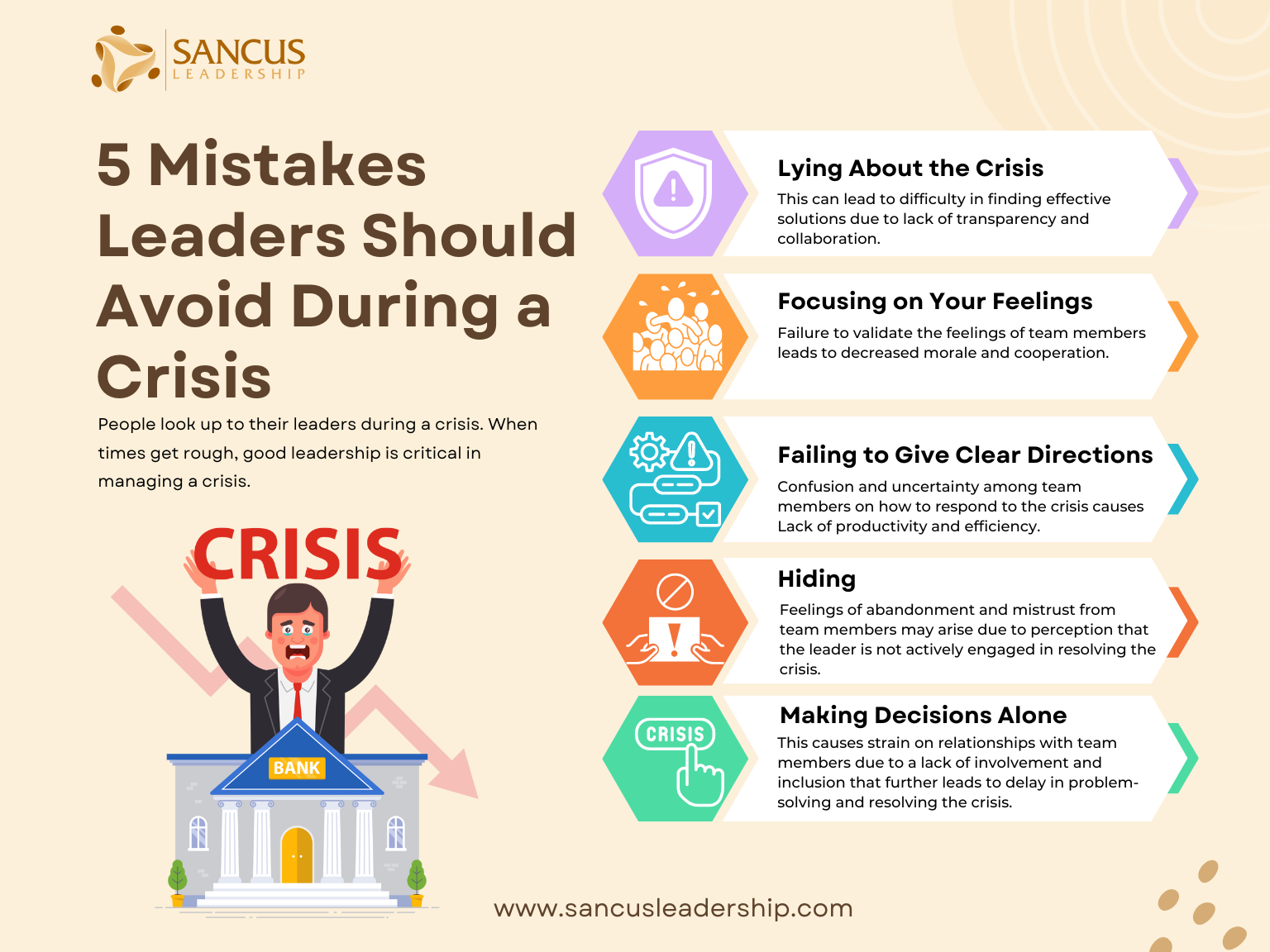In times of crisis, people look to their leaders. This has been especially true in my deployment with the armed forces. When times get rough, leadership doesn’t necessarily need to be excellent; I have seen a few big mistakes leaders must avoid!
The ways you can screw up as a leader during a crisis include lying to the group (team) about what’s happening, focusing only on what you think is best, and not giving clear directions.
Read on to learn why good leadership is critical in a crisis and what actions you’d want to avoid as a leader managing a crisis. Let’s get started.
How Important Is Leadership in Times of Crisis?

Leadership is essential during a crisis; most people need to think clearly amid the stress and need someone to turn to for directions. If leaders don’t take action, motivation drops, people focus on problems instead of solutions, and individuals prioritize themselves above the team.
The facts remain the same whether at a global level or with small teams of people — people need and want a leader when things go wrong.
If you think that things are already going wrong because you’re in a crisis, to begin with, you’re right. Without good leaders, things can go wrong quickly. However, it can get exponentially worse without a good leader.
I have been through many situations where leadership has failed me and the people around me; that’s the good thing with the military; it offers many examples to understand leadership.
Leaders should provide direction for the people. They ensure that the hard decisions get made, that people remain calm, and help a group arrive at a solution.
With this in mind, let’s look at some things leaders shouldn’t do during a crisis.
Mistakes Leaders Should Avoid During a Crisis

1. Lying About the Crisis

The quickest way to fail as a manager is to avoid transparency during a crisis. Many leaders mistakenly believe their teams should be kept out of the loop about what’s happening to keep them calm and help prevent drastic measures.
I remember being deployed in western Africa, where one of our senior commanders hid how poorly our medical chain was working (or wasn’t working, I should say). They thought It was best to hide it, not to worry us.
But, of course, this didn’t work out.
First of all, it’s near impossible to keep a crisis a secret. Invariably, people find out that a crisis is underway, especially in a small business. People are extraordinarily more observant than what they’re given credit for and are bound to notice something is off.
Secondly, it’s enormously challenging to come to solutions on your own. While it may be easier at first to downplay the crisis, it will be five times as hard to come up with a solution. Two heads are better than one.
Additionally, lying to the group causes them to lose faith in you as a leader. If you’ve hidden the crisis from them, what’s to say you can be trusted with anything?
And this was the exact thing that happened to the commander; his word didn’t mean very much to us. We would start making plans in the background, and we would start questioning every decision.
The trust was lost.
2. Focusing on Your Feelings
Getting out of your head enough to see how others feel can be challenging when you’re the manager. Concentrating on rescuing yourself and ensuring you are protected is natural. It’s also natural to believe that because you’re the leader, your feelings about the situation matter more than anyone else’s.
Getting out of your head enough to see how others feel can be challenging when you’re the manager.
Unfortunately, this isn’t the case. In fact, giving too much weight to your feelings can cause as many issues as lying to the group.
Everyone wants and needs to be heard. We all need our feelings validated. In a crisis, people are panicking. They can’t see the best options, and usually, everyone has their own opinion on what should be done.
It’s essential to remain aware of what the group, as a whole, is feeling. It’s also essential to see the individuals within the group. If you focus on how others are feeling during the crisis, you can make better decisions because it forces you to put others first.
The opposite is true when you focus on your feelings. It’s not that your feelings don’t matter. They do, but if that’s where your concentration is, it can rapidly lead to making a decision that only benefits you.
For this to make sense, we must separate the primary phase of a crisis (high chaos, rapid pace) from the secondary phase (less chaos, slower pace).
During the primary phase, fewer emotions and perspectives will be considered in favor of rapid decision-making. This allows us to exit the “deadly” part of the crisis, the situation that will destroy your business or team.
During the slower secondary phase, we can start to make decisions based on inputs from others, the decision-making loop can take longer, and the focus moves from surviving to rebuilding and improving.
3. Failing to Give Clear Directions

Let’s be honest. Most people aren’t thinking clearly during a crisis. People are emotional, and no one knows EXACTLY what is the correct thing to do — including you as the leader.
People count on their managers to give them clear direction on what to do next. However, sometimes in a crisis, the opposite happens. Panicked in their minds, leaders leave it up to the people to respond however they see fit.
This is one of the worst things you can do as a leader. The people are looking to you to give them direction. Even if you aren’t sure how to move forward initially, it’s best to be upfront about this and give them a clear path to wait for more instructions.
Sometimes, this will take the form of managers saying, “I trust you; what do you think is the best?” This may sound great, you know, trusting your team and all. But often, this is weak leadership attempting to transfer difficult decisions to subordinates instead of owning responsibility and fixing the situation.
” … many times this is weak leadership trying to transfer difficult decisions to subordintes instead of owning their responsibility and fixing the situation.”
We as leaders must take responsibility and act to the best of our ability!
4. Hiding

You may want to lock yourself away in a crisis because you feel it’s your job as the team leader to tuck yourself into an office and think through the situation as logically as possible.
I have been there, and many of my colleagues have to, so if you are truly honest with yourself, maybe you have to.
Sometimes, this is a great way to figure things out, but many leaders use it as a reason to put their heads in the sand and hide. And that’s where the problem starts.
This doesn’t have a good effect on your team. They are likely going to feel abandoned in this situation. While we’d all like to think that our team knows our intentions, this isn’t usually the case. Usually, if you’re hidden away, the people assume you’ve left them to their own devices, even if this isn’t the case.
Instead, you should spend as much time as possible with your team, examining the ins and outs of the crisis and coming up with solutions.
We used to talk about “soldier mentality,” the work that cannot be seen didn’t happen. Soldiers often complained about officers not doing anything other than hiding at their desks. Still, they would fail to realize that the only reason they had food and shelter for the night was because of that “keyboard officer.”
Striking a balance between making people understand you are doing your best and removing yourself from the situation to figure out what is the best can sometimes be challenging, especially if you are low on follower trust.
Trust is the difference between teams and groups, and I have spent 12 years understanding how to forge it; read more here.
5. Making Decisions Alone

One final way to screw up as a manager is to make decisions alone. As they say, “Teamwork makes the dream work.” Teamwork also gets a business through the second phase of a crisis a lot faster.
I started my officer career thinking I needed to show everybody that I could make the correct decisions, and if I asked others what to do, they would think I was weak.
I have never been so wrong in my entire life…
I have never been so wrong in my entire life…
Managers often feel they need to do everything independently to be strong leaders. After all, they’re the ones that everyone relies on to make great decisions. This belief system will wreck your relationships, however.
You can get your business out of a crisis a lot faster by making decisions with your team rather than trying to do everything alone.
When you’re working together to come up with solutions, you form what is sometimes referred to as a “mastermind.”
A mastermind is two or more people working together to devise solutions that wouldn’t be discovered on one’s own.
Working with your team for solutions can significantly affect how quickly the problem gets solved and how people perceive you as a manager If it is done correctly!
You can email me here if you want me to send you some more info on the “9 principles of utilizing your team to make better decisions”.
The conclusion after more than twelve years in leadership positions?
When you make decisions alone, they will lose faith in your capability as a leader.
| What to avoid during a crisis | Consequences of the mistake |
| 1. Lying About the Crisis | Avoiding transparency during a crisis and believing that keeping the crisis a secret will prevent drastic measures. However, crises are difficult to keep secret, and people are observant, eventually finding out about the situation. Being open and involving the team in finding solutions is more effective. |
| 2. Focusing on Your Feelings | Prioritizing personal feelings and concerns during a crisis can lead to overlooking the feelings of others. In a crisis, it’s crucial to listen and validate the team members’ emotions, as panicking individuals may have different opinions on handling the situation. |
| 3. Failing to Give Clear Directions | Not providing clear guidance and directions to the team can cause confusion and uncertainty during a crisis. Even if the leader is unsure initially, being upfront about it and giving the team a clear path or waiting for further instructions can be more beneficial. |
| 4. Hiding | Locking oneself away and hiding during a crisis may make the team feel abandoned. Although taking time to think through the situation is essential, spending time with the team, understanding the problem, and working together on solutions is crucial for their support and morale. |
| 5. Making Decisions Alone | Believing that strong leaders should make all decisions independently can harm relationships and delay crisis resolution. Collaborating with the team and forming a “mastermind” can lead to faster problem-solving and improve how the manager is perceived by the team. |
Here’s a video explaining how your leadership is tested when a crisis hits and how you can cope and overcome the challenges.


